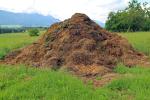PRERIVID Operational Group: Prediction of vineyard water needs for sustainable use of irrigation water
- Type Operational group
- Status In progress
- Execution 2024 -2027
- Assigned Budget 583.385,01 €
- Scope Supraautonómico
- Autonomous community Castilla y León; Comunitat Valenciana; Galicia
- Main source of financing CAP 2023-2027
- Project website GO PRERIVID
PRERIVID aims to develop a vineyard irrigation management tool that allows predicting requirements based on meteorological data, soil humidity and local weather forecasts. The aim is to determine water needs, develop a prediction model and an irrigation management tool, evaluate the impact of agronomic techniques, use new digital tools to assess water stress and transfer results to the sector.
The project focuses on predicting the water needs of the vineyard from meteorological data and developing calculation and prediction models, as well as understanding the economic impact of irrigation and crop management practices.
- Model for calculating vineyard water needs and estimating requirements for 7 days.
- 7-day prediction model of reference evapotranspiration (ETo) and crop coefficient (Kc) for each phenological stage, for different soil types and different wine-growing areas.
- Irrigation management tool that allows you to determine the current water needs of the vineyard and estimate future irrigation requirements.
- Management of agronomic techniques that affect the water status of the vineyard.
- Effect of water stress and cultivation practices on grape quality.
- Prediction of water stress and nutritional quality of the vineyard using NIR spectroscopy.
- Economic impact of irrigation practices and crop management (vegetative cover crops and kaolin) on vineyard management.
In a context of climate change, in which an increase in temperature is expected, as well as an erratic distribution of rain, both in quantity and timing, it is increasingly necessary to have tools that help winegrowers to carry out efficient irrigation planning, and therefore of the scarce water resources available.
Deficit irrigation strategies, employing more efficient irrigation systems such as localized irrigation, are the current starting point for vineyard irrigation management. However, this requires the inclusion of new factors that address the complexity of the current climate situation and the pressure exerted on water resources in Spain. The report 'Impacts and Risks Arising from Climate Change in Spain' identifies the main impacts of climate change on agriculture as increased water stress, phenological changes associated with shifting seasons, and damage from heat and extreme weather events, all of which jeopardize production.
Furthermore, the study identified a set of 73 risks, categorized according to their urgency. Among those classified as most urgent are several that highlight the wine sector's need to address projects like PRERIVID:
- Risk of reduced river flows or changes in their seasonal patterns.
- Risk of reduced availability of water resources for agricultural and industrial uses.
- Risk of increased eutrophication and/or deterioration of water quality.
- Risk of increased surface area of arid and semi-arid zones due to desertification.
- Risks arising from changes in the phenology of plant species (appearance of leaves and fruiting) that can cause decoupling between the biological cycles of interdependent species including animal species.
- Risk of increased disruption to crop cycles and modification/reduction in production as a result of the variation in the seasonality of horticultural activity.
- Risk of decreased yield of herbaceous species, especially irrigated ones, due to limitations in irrigation.
- Risk of loss of farms due to production losses and increased input prices.
PRERIVID aims to develop a vineyard irrigation management tool that predicts water requirements based on meteorological data, soil moisture, and local weather forecasts. The project seeks to determine water needs, develop a predictive model and an irrigation management tool, evaluate the impact of agronomic techniques, utilize new digital tools for assessing water stress, and transfer results to the agricultural sector.
The main results will be:
- Model for calculating vineyard water needs and estimating requirements for 7 days.
- 7-day prediction model of reference evapotranspiration (ETo) and crop coefficient (Kc) for each phenological stage, for different soil types and different wine-growing areas.
- Irrigation management tool that allows you to determine the current water needs of the vineyard and estimate future irrigation requirements.
- Coordinator/entity name: Galician University-Business Foundation (FEUGA)
- Postal address: Rua Lope Gómez de Marzoa S/N - Campus Vida, Santiago de Compostela, A Coruña
- Email coordinator/entity: l.carbia@feuga.es
- Telephone: +34 981534180
- Fundación Empresa Universidad Gallega (FEUGA)
- MONET TECNOLOGIA E INNOVACION
- QUINTA COUSELO
- QUINTA SARDONIA
- BODEGAS ENGUERA
- Universidad Santiago de Compostela (USC)
- Instituto Tecnológico Agrario de Castilla y León (ITACYL)
- Centro de Investigaciones sobre Desertificación (CIDE)
- El Instituto de Ciencias de la Vid y del Vino (ICVV)
- Presentation Webinar
- Presentation video
- Technical tip
- Video summary of demonstration workshop
- PRERIVID at the PTV seminar "Digital solutions for viticulture"






